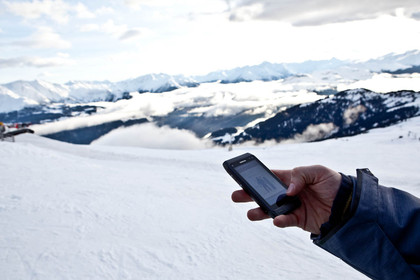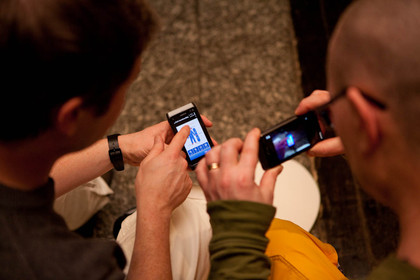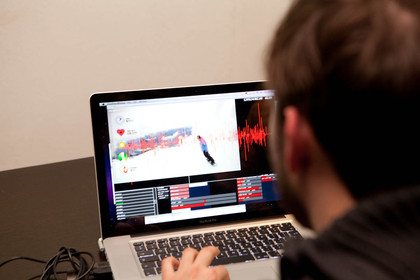Can a mountain become a social network?
Techradar heads to the Alps with Nokia to find out
Mount Poke
Mason's point is an interesting one - all the data captured from the Nokia handset could easily be transmitted to a central location and stacked up against all the other riders; imagine being able to approach a jump and checking out what other boarders have managed before attempting to 'own' a certain trick.
"What we want to do it introduce the gaming element, where we can do things like having the music interact with your run, offering robust data to your device from unobtrusive technology," said Wells.
He pointed out that once perfected, the phone could then do things like speed up the music in time with your heart rate, or play a sound effect every time you took a jump.

During the trials, there was lots of excited talk from the project organisers about what is possible with such technology and the data it provides, and while it all sounds good in theory it won't be as simple as beaming up all your scores and info to your favourite social network.
We spoke to Facebook to see whether all this information would be easy to integrate into the site, and it seems the technology could be a close fit in the future:
A spokesperson told us: "Users may want to share check-in information with third-party applications that build interesting experiences around location, such as travel planning.
"Facebook's open API means that developers can integrate location features into their applications but they must request permission for any of your data that they need to use to make the application work.
Sign up for breaking news, reviews, opinion, top tech deals, and more.

However there will need to be a large amount of work done before the privacy concerns are addressed - the arenas would likely have to be strictly designated and have a number of permissions designated before something like Facebook integration would be possible.
"You must actively check in or allow your friends to check you in before you can share your location, so this (having your phone check in for you] wouldn't be an option for developers," added Facebook.
Cyber-boarding
So what will all this data do in the future? Well, the Push Snowboarding team has released the datasets captured from our test and those from the pro riders at the Burton European Open, and these can be downloaded by developers to use as they see fit.
However, there may be a hiccup on the horizon after Nokia's recent announcement of a move to Windows Phone 7 devices as a 'primary smartphone strategy' - the main feature of the test was the ability of the flagship Nokia N8 to capture five Bluetooth streams at once, and if such devices are running Windows Phone 7, the developers will have a harder time creating the applications necessary.
Wells also said that the QT developer kit would mean such applications could be easily ported to MeeGo devices in the future - but it seems that project isn't going to go that way either now MeeGo has been dubbed an 'exploratory' project instead.
That hasn't stopped Nokia looking to the future, as the data from this Push Snowboarding project is still being used by developers to show what can be done with it, and will be presented at the US Open in March.

While Symbian has been criticised by many for its convoluted UI (including TechRadar), there's no doubting that it's still a mature and robust platform for developers - Nokia isn't planning to can the entire project, so there's still hope lower-end phones in the future (with improved user software on board preferably) could be used for projects such as this.
Of course, that wouldn't really be enough - other ecosystems need to embrace sensor-based technology to warrant the cost of adding it into boards and boots naturally.
But as it's an open API set released to developers, it's feasible that in the future all phones will be able to use such applications and smartphones will open up real time gaming using your whole body rather than just your fingers.
- 1
- 2
Current page: Turning the data into something cool
Prev Page Setting up for the Bluetooth Snowboarding trials
Gareth has been part of the consumer technology world in a career spanning three decades. He started life as a staff writer on the fledgling TechRadar, and has grew with the site (primarily as phones, tablets and wearables editor) until becoming Global Editor in Chief in 2018. Gareth has written over 4,000 articles for TechRadar, has contributed expert insight to a number of other publications, chaired panels on zeitgeist technologies, presented at the Gadget Show Live as well as representing the brand on TV and radio for multiple channels including Sky, BBC, ITV and Al-Jazeera. Passionate about fitness, he can bore anyone rigid about stress management, sleep tracking, heart rate variance as well as bemoaning something about the latest iPhone, Galaxy or OLED TV.